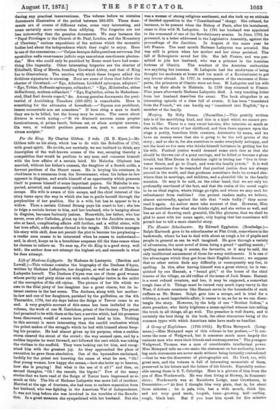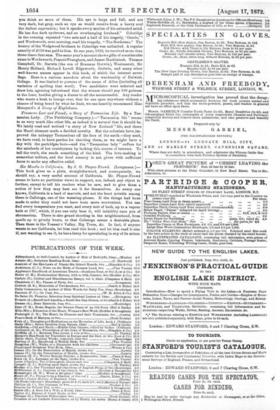A Group of Englishmen. (1795-1815). By Eliza Meteyard. (Long- mans.)ŌĆöMiss
Meteyard says of this volume in her preface,ŌĆö" It con- cerns the sons of Wedgwood, but it concerns much more largely the eminent men who were their friends and contemporaries." The youngest Wedgwood, Thomas, was a man of considerable intellectual power. Miss Meteyard tells usŌĆöwe make the statement on her authority, know- ing such statements are never made without being instantly contradicted ŌĆöthat he was the discoverer of photographic art. Ho lived, too, with great men, and the volume is full of interesting memorials of them, preserved in his letters and the letters of his friend3. Especially notice- able among these is S. T. Coleridge. Here is a picture of him from the pen of Miss Wordsworth. He was then living at Stowey, in Somerset- shire ; Wordsworth was at Racedown Lodge, near Crewkerne, in Dorsetshire:ŌĆö" At first I thought him very plain, that is, for about three minutes ; he is pale, thin, has a wide mouth, thick lips, and not very good teeth, longish, loose -growing, half - curling, rough, black hair. But if you hear him speak for five minutes
you think no more of them. His eye is large and full, and not very dark, but grey, such an eye as would receive from a heavy soul the dullest expression ; but it speaks every motion of his animated mind. He has fine dark eyebrows, and an overhanging forehead." Coleridge in the evening repeated "two acts and a half of his tragedy, ' Osorio,' " and Wordsworth, next morning, read his tragedy, "The Borderers." The bounty of the Wedgwood brothers to Coleridge was unlimited. A regular annuity of ┬Ż150 was paid to him. In one year, 1803, he received more than three times that sum. The same year's account shows gifts of considerable sums to Wordsworth, FranciaWrangham, and James Mackintosh. Thomas Campbell, Dr. Darwin (the son of Erasmus Darwin), Westmaeott, Sir Henry Holland, Richard Lovell Edgeworth, Godwin, and many other well-known names appear in this book, of which the interest never flags. Here is a curious anecdote about the wardenship of Dulwich College. It was limited to persons of the name of Allen (including all varieties of spelling that word). Two candidates were selected and drew lots, agreeing beforehand that the winner should pay 100 guineas to the loser, besides giving a dinner to all the unsuccessful. Any reader who wants a book to lounge over, that he can open any where without a chance of being bored by what he finds, we can heartily recommend Miss Meteyard's A Group of Englishmen.



































 Previous page
Previous page